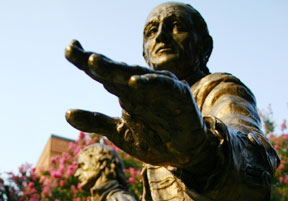In Jefferson's Footsteps: Law School Reinvigorates Citizen-Lawyer Ideal
The words of George Wythe are being reinvigorated inside the Law School. Photo by Alan Kennedy-Shaffer.
George Wythe began his tenure as the first law professor at the first law school in America with one goal in mind: "Here we will form such characters as may be useful in the national councils of our country."
Entering the school, it is easy to walk past these brief words carved below the imposing statues of Wythe and John Marshall. Once inside the school, however, the message is impossible to miss. 
A group of students, faculty, and administrators are busy breathing new life into the citizen-lawyer concept that guided Wythe, Marshall and Thomas Jefferson, acknowledging that lawyers sometimes focus too much on the lucrative and mercenary aspects of the legal world. The George Wythe Society of Citizen Lawyers emphasizes service and ways that lawyers and future lawyers can reengage the service aspect of the legal profession.
Dean Taylor Reveley said in a recent interview that "the original and enduring mission of the law school" is being "reinvigorated" with the assistance and leadership of the Wythe Society of Citizen Lawyers. "Lawyers are unusually good at leading," said Reveley, "and dealing with societal issues and problems."
Reveley likened being a lawyer to being a minister in that both involve a "calling" to serve others. He said that many members of the law school community already volunteer on a regular basis, donate money to worthy causes and hold leadership positions in a variety of areas. What the law school is trying to do now is to better organize service efforts and to give the citizen lawyer mission "vibrant force in the 21st century."
Beginning this fall, the Wythe Society of Citizen Lawyers plans to hold an annual speaker series to shine a spotlight on lawyers who are both doing well and doing good, according to Josh Whitley, LAW '08, the group's president. William and Mary President Gene Nichol will be the first speaker. Whitley said that the speaker series will "highlight how we can have pride in our profession and do acts that will allow others to have pride in the profession."
"There are lawyers who are disgracing the citizen lawyer concept and lawyers who are absolutely honoring it," Whitley said. By recognizing the struggles and successes of those lawyers who are carrying on the legacies of Wythe, Jefferson and Marshall, the Society of Citizen Lawyers hopes to "remind [the law school community and the world] that we are here as citizen lawyers."
Joelle Laszlo '09, is spearheading an effort to create an online network where lawyers and students can share information about the practical application of the citizen-lawyer concept. Taking the form of a blog, the citizen lawyer network may include profiles on people who embody the citizen lawyer ideal and ways in which people can engage the law in order to positively influence their communities and their country.
Laszlo recognized that although the citizen-lawyer concept is important, it can be rather "amorphous," encompassing many different kinds of public service.
"The goal [of the citizen lawyer network]," said Laszlo, "is to bring the citizen-lawyer concept down to the ground and help anyone with an interest in the law, be they current students or practicing lawyers, pursue the citizen-lawyer ideal."
Associate Dean Rob Kaplan, who oversees the law school's public service initiatives, said that although there are many ways to define public service, they all stem from a "service ethic." "It is that service component that would distinguish a citizen lawyer from someone who is just a lawyer," he said.
Kaplan and Reveley both mentioned pro bono legal work, or the direct provision of legal services to the indigent, as an important and unique way in which lawyers can apply their law degrees to the benefit of their local communities. Other areas of service include legal community service with non-profit legal advocacy organizations and non-legal community service with Habitat for Humanity.
"Combating discrimination, working to end it, increasing dialogue, would be among the types of service that citizen lawyers could do," said Kaplan, who emphasized that more important than the ways in which service is rendered are the "values that citizen lawyers should embrace." Kaplan said that he believes that the law school is headed in the right direction. He points to statistics that show that many students already engage in public service and views the efforts of the Wythe Society of Citizen Lawyers as proof that the law school is well on the way toward making public service a top priority.
"William and Mary Law School has a lot to be proud of and any thriving institution aspires to do more," he said.
Reveley stressed that Wythe's goal of producing lawyers willing to lead our country remains just as relevant today as it was in 1779. "The core idea is being useful," said Reveley, "doing something that promotes the public good."